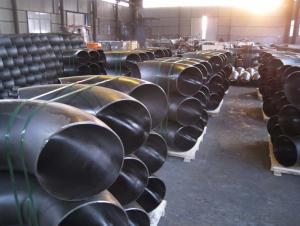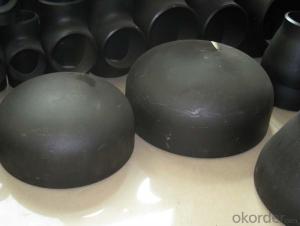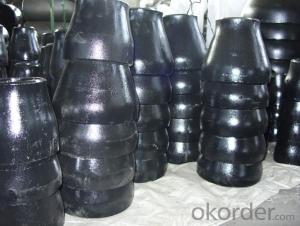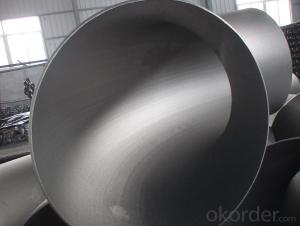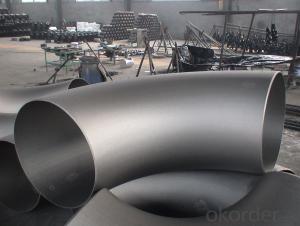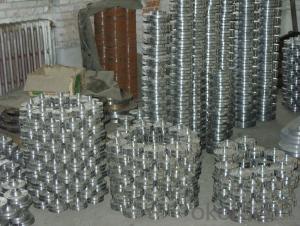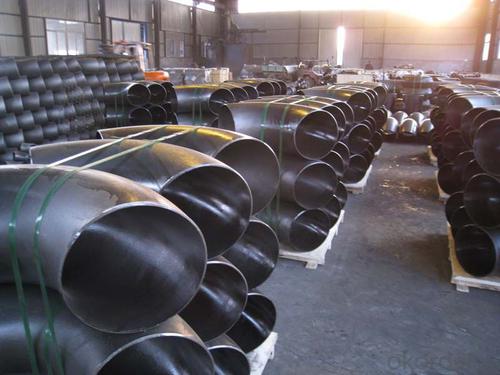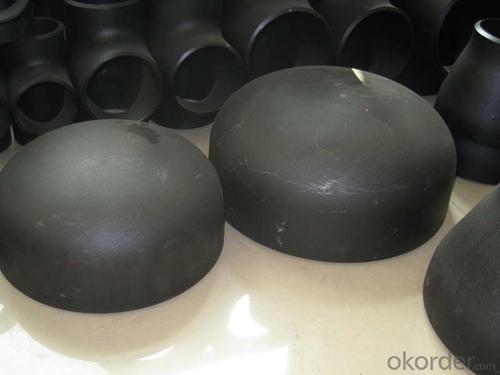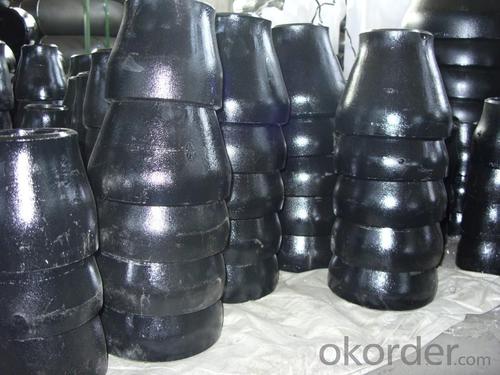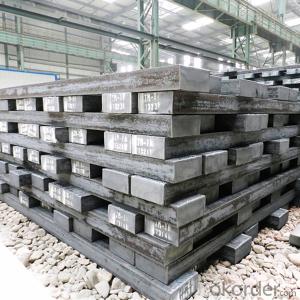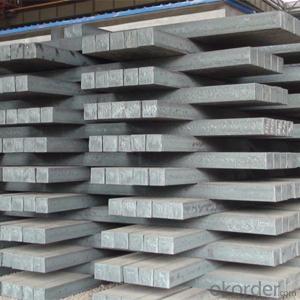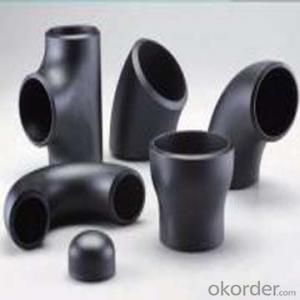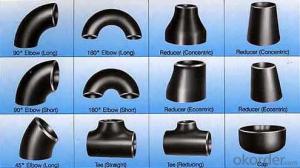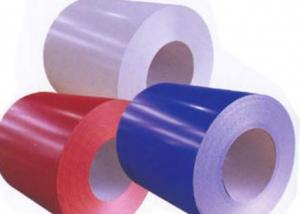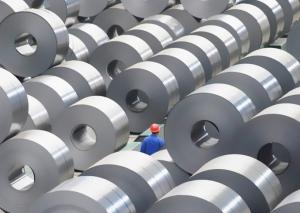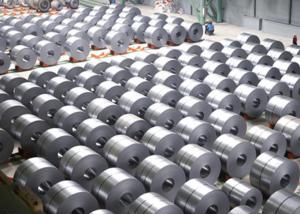Carbon Steel Pipe Fittings ASTM A234 BEND TEE
- Loading Port:
- China Main Port
- Payment Terms:
- TT OR LC
- Min Order Qty:
- -
- Supply Capability:
- -
OKorder Service Pledge
OKorder Financial Service
You Might Also Like
Specifications
pipe fitting elbow
Certificate:ISO:9001-2000
New material,completely meet asme and din standard
Best price
1. type: AISI ASTM A234 WPB BW Con Elbow
2. Size: 1/2"-48"(1/2"-24"is seamless and 26"-48"is welded)
3. Wall thickness: sch10-160, STD, XS, XXS
4. Material: A234WPB, A420WPL6, A420WP5, WP11, WP12, WP22, etc
5. Welding line: seamless
6. Angle of bend: 30, 45, 90, 180degree
7. Bending radius: SR, LR
8. Standard: ANSI B16.9, JIS, SB, DIN, GB
9. Surface treatment: black paint, vanis paint, black rust-proof oil,
transparent oil, hot galvanizing
10. Application: petroleum, electricity, chemical, natural gas, metallurgy,construction,
shipbuilding and other fields because of its high pressure, high temperature, etc
11. connection: welding
12. technics:forged
13.Certificate:ISO9001 - 2000, CE, SGS, etc.
14. packaging: wooden case, pallet, container or in accordance with the
requirement of customers
15. Principle: quality fist, customer first, credit first
16. payment: L/C T/T
17. delivery time: 7-25 days after payments
18. Notes: the bevel can be made in accordance with the special requirements
of the customers
19. Others: we can also produce the products according to the requirements
of the customers
The main production:
1. PIPE FITTINGS: elbows, tees, bends, reducers, cap, flanges and sockets etc.
2. PIPE: bult welded pipes, seamless pipes, threaded pipes, etc.
We sincerely welcom customers at home and abroad to visit us and seek common development.
- Q: What are the different types of steel tanks and vessels available?
- There are several different types of steel tanks and vessels available, including carbon steel tanks, stainless steel tanks, pressure vessels, storage tanks, mixing tanks, and fermentation tanks. Each type serves a specific purpose and is designed to meet various industry requirements, such as chemical storage, food processing, pharmaceutical manufacturing, or water treatment.
- Q: How are steel beams used in building structures?
- Steel beams are commonly used in building structures to provide support and stability. They are typically utilized as load-bearing elements, carrying the weight of the structure and transferring it to the foundation. Steel beams can span long distances, allowing for open and flexible floor plans in commercial and residential buildings. They are also used to create strong frameworks for bridges, warehouses, and high-rise buildings. Additionally, steel beams can be fabricated and shaped to meet specific structural requirements, making them versatile and widely used in construction.
- Q: What are the applications of steel gratings?
- Steel gratings have a wide range of applications due to their strong and durable nature. Some common applications include industrial flooring, walkways, platforms, stair treads, drainage covers, and security fences. They are also used in construction, oil and gas industries, transportation, and various other sectors where strength, stability, and drainage are essential.
- Q: What are the environmental impacts of producing steel products?
- The environmental impacts of producing steel products include emissions of greenhouse gases, such as carbon dioxide, during the iron and steel production process. Steel production also generates air pollutants, including sulfur dioxide, nitrogen oxide, and particulate matter. Additionally, the extraction of raw materials for steel production can lead to habitat destruction and deforestation. The steel industry also consumes large amounts of water and energy, contributing to resource depletion and potential water and air pollution. Overall, the production of steel products has significant environmental consequences that require sustainable practices and mitigation measures.
- Q: What are the different types of steel channels?
- There are several different types of steel channels, including C channels, U channels, and J channels. Each type has its own unique shape and dimensions, making them suitable for various applications in construction, manufacturing, and structural engineering.
- Q: How are steel products used in the food processing industry?
- Steel products are used extensively in the food processing industry due to their durability, corrosion resistance, and ease of cleaning. They are used to manufacture various equipment and machinery, such as storage tanks, conveyors, cutting and slicing tools, and food processing lines. Steel products ensure food safety by preventing contamination and maintaining hygiene standards, making them indispensable in the food processing industry.
- Q: What are the different types of steel rails and their applications?
- There are several types of steel rails used in various applications. Some common ones include: 1. Heavy-duty rails: These are used in high-traffic areas like mainline tracks for passenger and freight trains. They are designed to handle heavy loads and provide stability and durability. 2. Light rails: These are used in light-duty applications such as subway systems, tramways, and light-rail transit. They are typically lighter and more flexible, allowing for easier installation and maintenance. 3. Crane rails: These rails are specifically designed for use in crane systems, providing a stable track for heavy lifting operations in industries like construction, manufacturing, and shipping yards. 4. Grooved rails: These rails have a groove along their length, allowing for the installation of a flanged wheel, commonly used in tramways, streetcars, and some light rail systems. 5. Guard rails: These are installed at the edges of railway tracks to prevent derailments and ensure the safety of trains. They are generally made from high-strength steel to withstand impact and provide protection. The choice of steel rail depends on the specific application, load requirements, and environmental factors. Each type has its own advantages and is used accordingly to ensure efficient and safe transportation.
- Q: How are steel products used in the construction of schools and educational institutions?
- Steel products are widely used in the construction of schools and educational institutions due to their durability, strength, and versatility. They are used for various applications such as structural framing, roofing, doors, windows, and partitions. Steel beams and columns provide support and stability to the buildings, ensuring their longevity and resistance to natural disasters. Additionally, steel is often used in the construction of gymnasiums, laboratories, and auditoriums due to its ability to span large distances without the need for additional support, allowing for more open and flexible spaces. Overall, steel products play a crucial role in creating safe, efficient, and aesthetically pleasing educational facilities.
- Q: How is steel tubing manufactured?
- Steel tubing is manufactured through a process called tube making, which involves various steps such as heating, welding, and shaping steel strips or plates into a cylindrical form. These strips are first heated and then passed through a series of rollers to form a continuous tube. The edges are then welded together, and the tube is further shaped and sized using additional rollers. Finally, the tube is cut to the desired length and undergoes various finishing processes to meet the required specifications and quality standards.
- Q: What are the advantages of using steel plates in manufacturing?
- There are several advantages of using steel plates in manufacturing. Firstly, steel plates offer high strength and durability, making them suitable for applications that require load-bearing capabilities. Secondly, steel plates are resistant to corrosion, making them ideal for industries where exposure to moisture or chemicals is common. Additionally, steel plates can be easily shaped and formed, allowing for customization according to specific project requirements. Lastly, steel plates have excellent thermal conductivity, ensuring efficient heat transfer in various manufacturing processes.
Send your message to us
Carbon Steel Pipe Fittings ASTM A234 BEND TEE
- Loading Port:
- China Main Port
- Payment Terms:
- TT OR LC
- Min Order Qty:
- -
- Supply Capability:
- -
OKorder Service Pledge
OKorder Financial Service
Similar products
Hot products
Hot Searches
Related keywords
